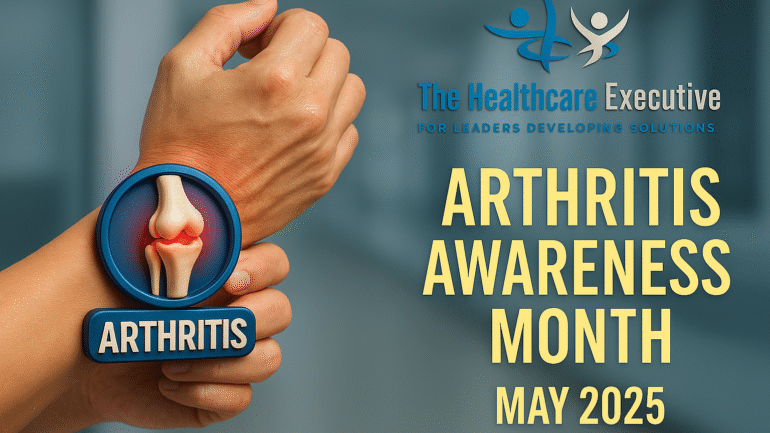Arthritis Awareness Month – May 2025

- Posted by Greg Wahlstrom, MBA, HCM
- Posted in Health Observance Calendar
Executive Leadership in Arthritis Care: Equity, Innovation, and Access
Published: May 1, 2025
May marks Arthritis Awareness Month, a important time to reflect on the widespread impact of a disease that affects over 53 million adults in the United States alone. Despite its prevalence, arthritis is often overlooked in strategic care models, particularly when symptoms are non-acute or overlapping with other musculoskeletal issues. Executive healthcare leaders must use this observance to prioritize chronic disease management as a pillar of health equity and workforce planning. Arthritis is the leading cause of disability among U.S. workers, contributing to billions in lost productivity and healthcare utilization annually. Organizations such as Cleveland Clinic have taken a leadership role by integrating arthritis screenings into annual wellness exams. These types of early-detection efforts can reduce long-term surgical interventions and improve quality of life. In the context of an aging workforce and increasing comorbidity rates, arthritis strategy is no longer optional—it’s essential. This month, hospitals have an opportunity to spotlight arthritis not only as a clinical concern but as an operations and population health priority. Leaders who act now will improve both care delivery and patient satisfaction metrics in the long term.
From a systems perspective, arthritis care must evolve beyond reactive treatment toward proactive lifestyle and function management. At Johns Hopkins Medicine, executives are advancing holistic care pathways that integrate orthopedics, physical therapy, rheumatology, and behavioral health into a single continuum. These models show promise in reducing ER visits and improving pain management outcomes. For executives, the financial and reputational ROI of investing in arthritis programs is clear—especially when linked to quality improvement and community benefit benchmarks. Furthermore, workplace wellness programs tailored to joint health can yield improvements in staff retention, morale, and physical capacity. Health system leaders must align arthritis education with broader workforce engagement strategies, making it a foundational aspect of employee health campaigns. For hospital systems with large outpatient networks, arthritis care coordination can serve as a model for managing other chronic conditions. By removing silos and focusing on patient-centered design, leaders transform care models that were once fragmented into high-performing, integrated experiences. Forward-thinking strategy will define which systems succeed in chronic care delivery—and which fall behind.
Digital health is also reshaping the future of arthritis care. Wearable technology, AI-assisted imaging, and patient-reported outcomes measures are helping clinicians track inflammation, mobility, and medication effectiveness in real time. At Mayo Clinic, executives are supporting arthritis-focused virtual clinics that improve access to care for rural patients with limited mobility. These virtual-first models are scalable and cost-effective, while maintaining strong continuity between primary care and rheumatology. Importantly, the success of these digital platforms depends on board-level prioritization and governance. Leaders must ensure that arthritis tools are interoperable with EHR systems, compliant with privacy laws, and supported with appropriate staff training. These tools also provide valuable data for identifying care disparities, such as lower access rates among Medicaid populations. Analytics dashboards can guide targeted outreach, reinforcing a system’s commitment to equitable care. Executives who embrace technology not only modernize care but position their institutions as champions of innovation in chronic disease management. Strategic investment in arthritis tech today will help hospitals stay competitive and compassionate tomorrow.
Arthritis is not experienced equally. Women, older adults, and people in rural or underserved communities are more likely to live with undiagnosed or undertreated joint conditions. Hospital leaders must ensure that arthritis awareness campaigns, screenings, and support services are accessible across all demographics and care settings. Health systems like UCHealth are expanding mobile screening units and multilingual materials to close the gap in arthritis diagnosis and care. Executive leadership should also support patient advocacy groups and community organizations that offer peer education and social support. Internal equity audits can help identify gaps in referrals, treatment initiation, and post-discharge outcomes for arthritis patients. Through transparent data reporting and community collaboration, hospitals can shift arthritis from a silent disability to a visible part of the care equity movement. Every patient deserves pain management strategies that are proactive, personalized, and rooted in compassion. Equity-driven arthritis strategy requires more than awareness—it demands bold leadership and systemic follow-through.
Arthritis Awareness Month is not just about recognizing the burden of disease—it’s about reimagining how hospitals respond. Executive teams have the tools, data, and reach to ensure that arthritis is treated as seriously as other chronic conditions in strategic planning and clinical operations. From digital innovation to equity audits, this observance offers an inflection point for leaders to make arthritis care smarter, more accessible, and more aligned with long-term outcomes. Hospital boards, clinical leadership, and community outreach teams must collaborate to embed arthritis responsiveness into culture, systems, and budget priorities. The patients living with joint pain, inflammation, and mobility loss every day are counting on leadership to deliver change—not just during May, but year-round. In doing so, healthcare executives will show that pain relief, dignity, and proactive care are not luxuries—they are leadership obligations.
Discover More:
Explore how chronic disease strategy and executive leadership intersect during national health observances like Arthritis Awareness Month.
Internal Links
- The Healthcare Workforce Crisis: Executive Solutions That Actually Work
- World Malaria Day 2025: A Call to Global Health Leadership
- Rebuilding Trust in U.S. Healthcare: A Leadership Blueprint



